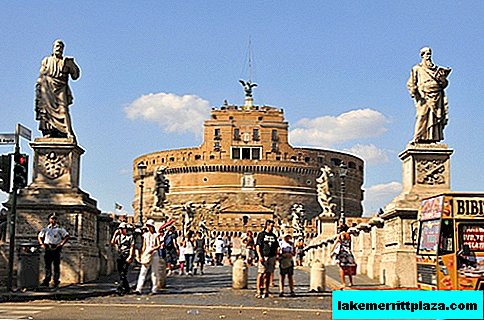44 year BC.
The ruler of Dacia becomes a king with a sweet name Komosik, Cleopatra poisons Ptolemy XIV, Indo-Scythian kings conquer Gandhara.
And in Rome, Mark Junius Brutus and Gaius Cassius Longin, with their associates, inflict 23 stab wounds on Guy Julius Caesar, dictator of the Roman Republic, which Caesar cannot survive.
This is one of those rare cases when a political murder by at least one main participant is committed out of selfless motives and in the name of all good versus all bad. Looking ahead, we’ll immediately say that it turned out only worse.
To explain why Brutus, who was one of the dictator's favorites, decided to enter his name in the world history of betrayal in a capsloc, you will have to rewind time a little back.
The triumvirate, previously formed by Crassus, about which we already read about Spartak, Pompey (who was actively mentioned there) and Caesar (about which every educated person at least heard), ended in 53 in connection with an overdose of gold in the body first. Literally after 4 years, the republic plunged into a civil war - the power is divided very poorly into two when there is no decent third.
Pompey, despite all his coolness, was not ready for Caesar's sudden attack, and the fighting went so-so from the very beginning, and ended for him even worse - a year later, driven into Egypt, the former consul was killed by local nobles who joyfully ran to meet Guy Julius with his head.
He, contrary to their expectations, did not appreciate the initiative at all, although he was considered a much greater supporter of violent methods of influence than the deceased. The further life of the noble killers has developed so-so.
The war for the one-man management of Caesar ended completely only in the year 45 - the republic was by then great, and Guy had to admonish the separatists and opportunists personally. After all, one must support the image of the invincible god of war.
Finally, completely (almost) the fences of dissidents, who raised weapons openly, the dictator was able to return to the capital and begin to rule. For the year he was given, Julius managed to do a pretty good job.
Firstly, the nuts of the Senate freemen began to tighten pretty much. One of his supporters, Mark Anthony, succeeded especially in the various repressions and pushing the rights of the noble. This person was so vain, power-hungry, and prone to ostentatious wealth, that she regularly received from the head and from Caesar himself, despite all the help Mark provided him while Guy was forced to drive around the provinces. Even before the end of the civil war, Anthony, in his way of life and mode of action, earned a serious dislike of both senators and many simpler inhabitants of the Republic. Especially known to many, the speaker Cicero, who, being a rather idealistic person, could not understand in any way, from what reunion in such a difficult year, all sorts of Anthony have had noisy parties in Rome, boasting in heaps of gold and have just not been shot from the Kalashnikovs in the air for their absence .
Secondly, freedom became less and less, and Caesar - more. Not only that, at the age of 54, he was appointed dictator for another 10 years (count, for life), without too motivating it and not bothering with legal justifications for such an action. Not only that, he himself stated that 10 years is not enough, and he is not going to remove his authority from himself. Not only that, an active campaign began on his deification with the minting of portraits on coins, turning the birthday of the "father of the nation" into a religious holiday and the construction of churches in his honor. So Caesar also defiantly refused to get up from the throne, if senators came to him, everywhere he roamed in a laurel wreath (which, in a good way, could be dragged only during triumph), and serious rumors circulated that he was about to be elected king, and finally do not give a damn about the centuries-old foundations of the republic.
It is not surprising that by the year 44, having looked around, many senators realized that in a very short time some kind of Rome had formed around them, forgive the Lord, Pyongyang, and it is completely unclear how far this can go.
Which brings us back to the person of Mark Junius Brutus. Initially a former supporter of Pompey, a rather naive and correct young man was disappointed in him, and after another defeat Gnei joined Caesar, quickly becoming his favorite. Brutus, like Cicero, lived on the ideals of the republic and old Roman traditions (which did not prevent him from using his posts for personal enrichment - this is also quite a Roman customs of the time). For a long time, Junius looked at what was happening, but retained complete loyalty to Caesar, despite the thick trolling from anonymous people who reproached him with the resemblance of the name to the legendary ancestor Lucius Junius Brutus, who from time immemorial overthrew the last Roman king, Tarquinius the Proud. Cicero, who was constantly frustrated by what was happening in the country, also noted himself in agitation, a couple of times transparently hinting to the guy that it would be nice to somehow solve the problem for the better.
For the time being, everything was in vain. But in the year 44, after watching how Caesar coquettishly rejects the tsar’s diadem, which the obliging Mark Antony regularly tries to jam on his bald head, Brutus still realized that he would have to repeat the heroic deed of ancestors, thereby refusing the brilliant future and crossing out all the benefits for himself .
What was Brutus' self-sacrifice? What surprises did Caesar give to the amazed public after death? What happened in Rome after the death of a dictator?
About it - in the next releases.
History Fun specifically for the site ITALY FOR ME.








